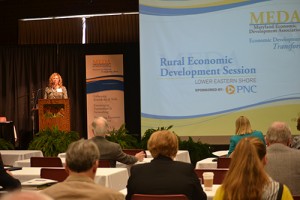
SALISBURY – The area’s municipal and political leaders shared their thoughts and concerns for the region last week at the first-ever Lower Eastern Shore Rural Economic Development Session.
The event, held Nov. 19 and 20 at Salisbury University, included a variety of workshops as well as addresses from keynote speakers Mike Gill of the Maryland Department of Commerce and Kenneth Holt of the Maryland Department of Housing and Community Development. The first of its kind event was hosted by the Maryland Economic Development Association (MEDA).
Merry Mears, Worcester County’s director of economic development, said the session provided local leaders with a chance to share ideas and enhance economic development on the Eastern Shore.
“This is a two-way dialogue,” she said. “People are going to compile this and move forward with some of these things.”
Mears said topics covered during the two-day event included business retention, façade renovation grants, infrastructure and workforce development, among other things. Attendees also had the opportunity to take a bus tour of Salisbury with Mayor Jacob Day and were able to visit the Eastern Shore Innovation Center.
“The Eastern Shore is its own place,” Mears told those at Friday’s session. “How we can work together to market the Eastern Shore is something to start thinking about.”
Guest speakers on Friday included representatives from NASA Wallops Island, Northrop Grumman, Sysco and Wor-Wic Community College.
Jerry Barbierri, human resources director for Sysco, discussed the company’s years of operations on the shore as well as the customer mix that enabled it to stay successful. Barbierri talked about the value the company — which sits 61st on the Fortune 500 list — placed on local businesses and maintaining a presence in the community. He said in spite of Sysco’s size — the company employs 465 people in Pocomoke — it still had trouble filling certain vacancies. He said delivery drivers could be difficult to sign on because the company required a year of CDL driving experience and because the individuals were not only drivers but customer service representatives.
“Our drivers are our face to the customer,” Barbierri said.
He went on to say the company also had trouble hiring warehouse selectors — the people who drive pallet jacks in the warehouse. Few people have the training needed for the job.
“We’d love to have a startup opportunity with a government or school to do an after-hours training program,” Barbierri said. “That’ll give us a pipeline.”
He stressed that the company was interested in doing what it could to build its workforce, as people were a key part of Sysco.
“We’re not Amazon,” he said. “We cannot put robots in our warehouse. We need people.”
Following the sessions Thursday and Friday, local economic development officials and political leaders from throughout the shore said they appreciated the chance to discuss regional economic development issues.
“It was nice hearing about topics relevant to us here on the Eastern Shore,” said Ivy Wells, Berlin’s economic development director. “Most of the MEDA conferences are in Baltimore.”
Michael Day, Snow Hill’s economic development consultant, said he was impressed with the event’s speakers and was encouraged by the commitment they’d expressed to supporting tourism in rural areas. He said the session also provided attendees with plenty of chances to network.
“It was good to see people from the other rural towns,” he said, adding that it would be great to see the session return to the area in the future. “It’s a great morale booster and motivation.”
Mears said Worcester County had been instrumental in bringing the event to the Eastern Shore and that she planned to continue working with MEDA to offer similar opportunities in the future.
“The Rural Economic Development Session provided a forum for local decision makers to make one-on-one connections across our region, and to have the necessary discussions to foster growth in a responsible manner,” she said.

